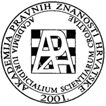Presidency of the Academy of Legal Sciences of Croatia, motivated by the views expressed by the European Commission on 4 July 2017 on the award of the Arbitral Tribunal in the border dispute between Croatia and Slovenia, hereby issues – to the competent state bodies and the Croatian public – the following:
STATEMENT
- The questions of arbitration process, the contents of the award and its implementation are matters of international law and do not fall within the competencies of the European Commission, as defined by Article 17 (1) of the Lisbon Treaty on the European Union:
“The Commission shall promote the general interest of the Union and take appropriate initiatives to that end. It shall ensure the application of the Treaties, and of measures adopted by the institutions pursuant to them. It shall oversee the application of Union law under the control of the Court of Justice of the European Union. It shall execute the budget and manage programmes. It shall exercise coordinating, executive and management functions, as laid down in the Treaties. With the exception of the common foreign and security policy, and other cases provided for in the Treaties, it shall ensure the Union's external representation. It shall initiate the Union's annual and multiannual programming with a view to achieving inter-institutional agreements.”
- The above-mentioned matters are not part of EU law, which is why EU institutions are not in a position to decide upon them. Matters related to foreign policy and international legal relations of Member States, even if they would be of interest to the EU – in relation to the provisions about the Common Foreign and Security Policy, as per Title V of the Lisbon Treaty on the European Union – would not be subjected to supranational legally binding acts of the EU. These matters, therefore, are beyond the scope of competences that have been conferred upon the EU and they, in the sense of Article 4(1) and (2) and Article 5(2) of the Lisbon Treaty on the European Union, "remain with Member States". Therefore, these matters are matters of these two Member States' bilateral relationship and matters related to the implementation of general rules of international law on dispute settlement (e.g. Article 33 of the UN Charter).
- In accordance with Article 5, competences not conferred upon the Union in the Treaties remain with the Member States.
- The Union shall respect the equality of Member States before the Treaties as well as their national identities, inherent in their fundamental structures, political and constitutional, inclusive of regional and local self-government. It shall respect their essential State functions, including ensuring the territorial integrity of the State, maintaining law and order and safeguarding national security. In particular, national security remains the sole responsibility of each Member State.” (Art.4, paras.1 and 2)
- Slovenia's material breach of the Arbitration Agreement and its devaluation of the arbitration process do not just question the EU Member States' confidence to submit their disputes to similar EU supported arbitration proceedings, but they also present direct violation of some of the fundamental common values of the EU, such as the rule of law (Article 2 and Article 21(2) of the Lisbon Treaty on the European Union), the principle of "sincere cooperation" (Article 4(3) of the Lisbon Treaty on the European Union), as well as "principles of international law" (Article 21(2b) of the Lisbon Treaty on the European Union), which undoubtedly includes principles of good faith and party equality.
- In conclusion, although the European Commission reminds of the role it had in facilitating the conclusion of the Arbitration Agreement between Croatia and Slovenia in 2009, in 2015 it unfortunately failed to react to Slovenia's material breach of that Agreement and its subsequent devaluation of the arbitration process. It therefore follows that in resolving this dispute the EU can again act as an intermediary, by offering its good services et al., but it has no competence to "decide" in it.
Zagreb, 6 July 2017
Presidency of the Academy


